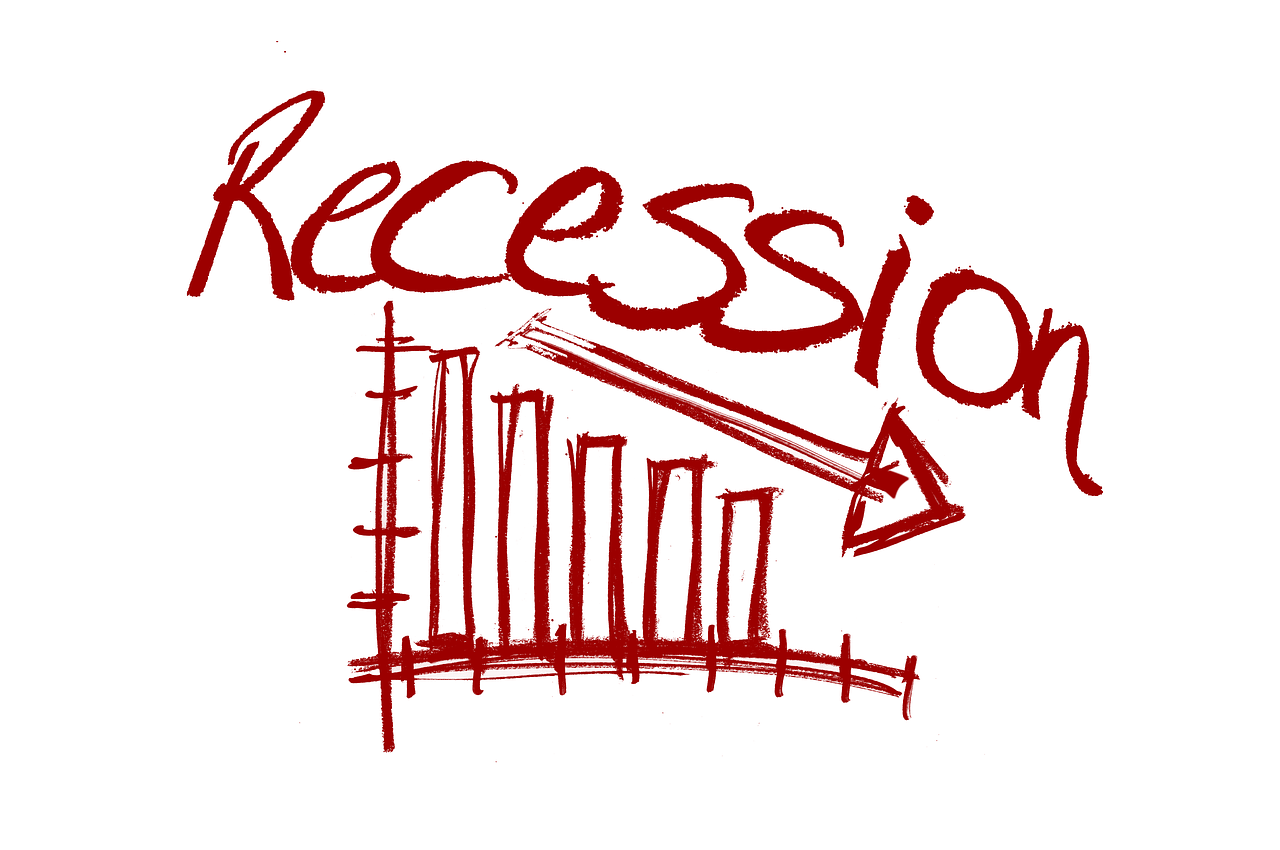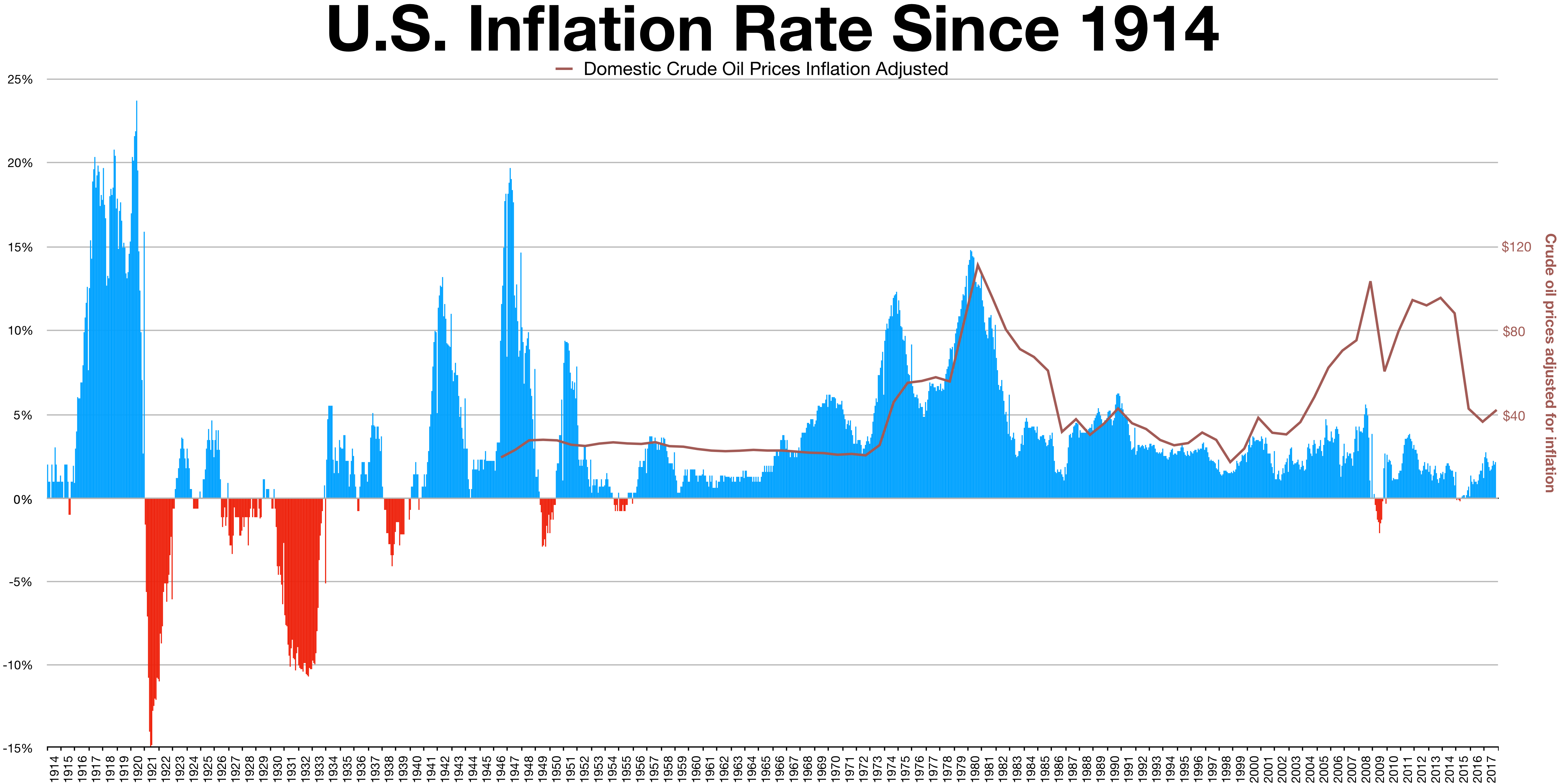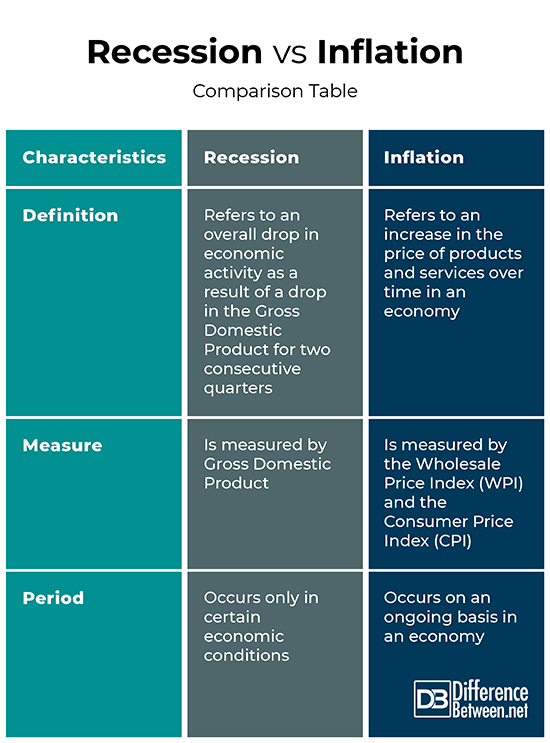Difference Between Recession and Inflation
The terms recession and inflation are very common in economic discussions. Although we experience different business cycles from contraction, peak, expansion, and trough, we may not predict the economic outcomes of each cycle. While we all know that these two terms do not favor economic growth in any way, the causes, as well as the effects on an economy differ, as outlined below.

What is a Recession?
This is an overall decrease in economic activities as a result of a drop in the Gross Domestic Product for two consecutive quarters. Although less severe than a depression, a recession is characterized by high unemployment levels, low commodity prices, a fall in the price of assets and low sales. This lowers the confidence in an economy. The numbers of recessions worldwide are about 33 since 1854.
Although every recession is unique, some known causes of recessions include:
- Low consumer confidence in the economy- When consumers have low confidence in an economy, the spending habits change, and people only consume necessities.
- High levels of unemployment- these results in low consumption which in turn leads to a drop in the sales. Employers are hence forced to cut costs. Some positions may also become redundant. This leads to a high level of unemployment.
- High-interest rates- High-interest rates limit liquidity, lowering the number of investments in an economy.
- A fall in housing prices and sales- Homeowners are forced to cut back on spending as a result of lost equity.
- Deregulation- Some government regulations may lead to recessions.
- Bursting of bubbles
- Post-war slowdowns
In a bid to save the situation, governments may adopt macroeconomic policies such as decreasing taxation, increasing government spending and increasing the money supply.

What is a Inflation?
This is an increase in the price of products and services over time in an economy. Subsequently, every unit of currency purchases lesser services and products, hence weakening the currency. Although economists claim moderate inflation is beneficial for an economy, high inflation signifies an overheated economy.
Inflation occurs as a result of the growth of an economy which leads to a higher demand for products and services. As a result of this, the demand overpowers the supply, causing the prices to rise. Inflation is expressed as a percentage and indicates a decrease in the purchasing power of a currency. It is measured using the Wholesale Price Index (WPI) and the Consumer Price Index (CPI).
Inflation is classified into:
- Demand-pull inflation- This is inflation caused by an increase in the demand for products and services higher than an economy can produce hence creating a demand-supply gap.
- Cost-push inflation- This is inflation caused by an increase in the cost of production causing a price increase in the final products.
- Build-in inflation- This is inflation caused by past events and persists in the present. As an effect, workers may demand an increase in wages resulting in a rise in the costs of products and services.
Inflation favors the asset holders as the value of the assets rises. However, it does not favor people holding cash as the value of the currency declines.
Inflation should be regulated by employing measures through monetary policies whereby the central bank determines the rate and size of growth of the money supply.
Similarities between Recession and Inflation
- Both affect economic activities
- Both are caused by hostile economic outcomes
Differences between Recession and Inflation
Definition
Recession refers to an overall drop in economic activity as a result of a drop in the Gross Domestic Product for two consecutive quarters. On the other hand, inflation refers to an increase in the price of goods and services over time in an economy.
Measure
While a recession is measured by Gross Domestic Product, Inflation is measured by the Wholesale Price Index (WPI) and the Consumer Price Index (CPI).
Period
While a recession occurs only in certain economic conditions, inflation occurs on an ongoing basis in an economy.
Recession vs. Inflation: Comparison Table

Summary of Recession vs. Inflation
Recession refers to an overall drop in economic activity as a result of a drop in the Gross Domestic Product for two consecutive quarters and is measured by Gross Domestic Product. On the other hand, inflation refers to an increase in the price of products and services over a period of time in an economy. It is measured by Wholesale Price Index (WPI) and the Consumer Price Index (CPI). Both are, however, caused by hostile economic outcomes.
- Difference Between Profit Center and Investment Center - July 2, 2022
- Difference Between Anti-Trust and Anti-Competition - June 6, 2022
- Difference Between Stocktaking and Stock Control - June 6, 2022
Search DifferenceBetween.net :
Leave a Response
References :
[0]Ball L & Mazumder S. Inflation Dynamics and the Great Recession. International Monetary Fund, 2011. https://books.google.co.ke/books?id=U5ZtVStfj98C&printsec=frontcover&dq=difference+between+recession+and+inflation&hl=en&sa=X&ved=0ahUKEwjMiu7gvq7oAhVuRxUIHWW3BS4Q6AEIJTAA#v=onepage&q=difference%20between%20recession%20and%20inflation&f=false
[1]Congress. Senate. Committee on the Budget. Inflation and Recession: Are High Interest Rates the Cause Or the Cure?. U.S. Government Printing Office, 1980. https://books.google.co.ke/books?id=KkfRd9yBXzYC&pg=PA15&dq=difference+between+recession+and+inflation&hl=en&sa=X&ved=0ahUKEwjMiu7gvq7oAhVuRxUIHWW3BS4Q6AEIZzAI#v=onepage&q=difference%20between%20recession%20and%20inflation&f=false
[2]Stavrev E & Matheson T. The Great Recession and the Inflation Puzzle. International Monetary Fund, 2013. https://books.google.co.ke/books?id=Ys_X1KqHfG0C&pg=PA7&dq=Recession+vs.+Inflation&hl=en&sa=X&ved=0ahUKEwjL0IeTkLHoAhWIUcAKHSoOAaYQ6AEITjAF#v=onepage&q=Recession%20vs.%20Inflation&f=false
[3]Image credit: https://storage.needpix.com/rsynced_images/recession-2530812_1280.png
[4]Image credit: https://upload.wikimedia.org/wikipedia/commons/0/00/Inflation_and_oil.png
